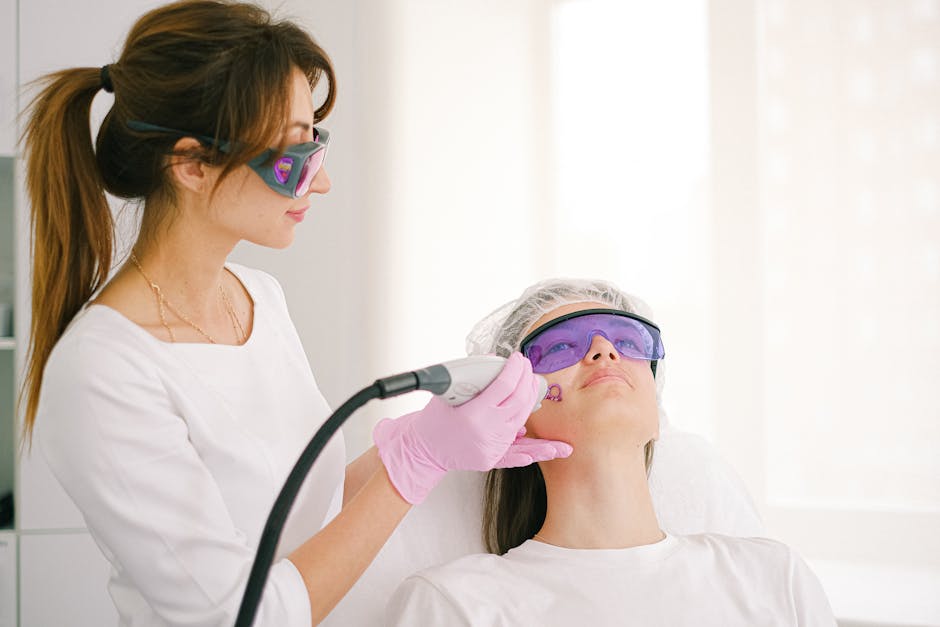Get Your AI Analysis
Personalized skincare insights
Discover your perfect skincare routine with our AI-powered analysis. Get personalized recommendations for glowing, healthy skin.
Start AnalysisFollow Us
Stay updated with the latest skincare tips, trends, and expert advice.
Biotech Innovations Targeting Stubborn Dark Spots in 2025: A New Era of Clarity
As a skincare veteran with over a decade immersed in the ever-evolving world of dermatology, I’ve witnessed countless trends come and go. But what’s brewing for 2025 isn’t just a trend – it’s a revolution. Stubborn dark spots, those unwelcome souvenirs of sun exposure, inflammation, or hormonal shifts, have long been one of the most frustrating skin concerns. Traditional treatments, while effective to a degree, often require immense patience and diligent application, sometimes yielding incremental results. But thanks to groundbreaking advancements in biotechnology, we're on the cusp of an era where targeting hyperpigmentation is not just about fading, but about precision, prevention, and unparalleled efficacy.
Forget everything you thought you knew about dark spot correction. In 2025, the skincare landscape is being reshaped by sophisticated lab-engineered actives, bio-mimetic peptides, and smart delivery systems designed to tackle hyperpigmentation at its root, offering a level of clarity and uniformity previously only dreamt of. This isn't just about stronger ingredients; it's about smarter science. Join me as we delve into the future, exploring the cutting-edge biotech innovations poised to transform how we treat and prevent those persistent patches.
Understanding the Enemy: The Intricacies of Hyperpigmentation
Before we dive into the future, let's briefly revisit the past. Dark spots – whether melasma, post-inflammatory hyperpigmentation (PIH), or sun spots – are caused by an overproduction of melanin, the pigment responsible for skin color, by specialized cells called melanocytes. This overproduction is triggered by various factors, including UV radiation, hormonal fluctuations, injury, or inflammation. The challenge lies not just in reducing existing melanin, but in inhibiting its future production and safely removing the excess pigment without causing further irritation or damage. According to a 2023 study published in the Journal of Cosmetic Dermatology, hyperpigmentation affects over 60% of women over 40 globally, highlighting the widespread need for more effective solutions.

The Biotech Revolution: Next-Generation Ingredients Leading the Charge
1. Peptides Reimagined: Precision-Targeted Melanin Inhibitors
Peptides, the small chains of amino acids, are already celebrated for their anti-aging benefits. But in 2025, a new generation of peptides is emerging, specifically engineered for melanin inhibition with unparalleled accuracy. These aren't your grandmother's peptides; these are bio-mimetic powerhouses designed to mimic the body's natural processes or block specific pathways involved in pigment production.
Signal Peptides (e.g., Oligo-5-Melanin Blocker): These advanced peptides are designed to interfere with the signaling cascades that tell melanocytes to produce melanin, effectively turning off the 'on' switch before hyperpigmentation even forms. Clinical trials are showing promising results in significantly reducing the recurrence of melasma.
Neuro-Peptides (e.g., Dipeptide-7-Clarity): Some hyperpigmentation is exacerbated by stress signals within the skin. These peptides work by calming overactive nerve endings that can trigger melanocyte activity, offering a novel approach to PIH and hormonally induced dark spots.
Encapsulated Copper Peptides (e.g., GHK-Cu-Plus): While copper peptides are known for wound healing and collagen stimulation, new formulations encapsulate them to deliver targeted anti-inflammatory and antioxidant benefits directly to hyperpigmented areas, reducing the inflammatory trigger for melanin production.
"The precision of next-gen peptides is a game-changer. Instead of broadly suppressing melanin, we can now target specific pathways with minimal impact on surrounding healthy skin. This translates to fewer side effects and more dramatic, consistent results, especially for sensitive skin types prone to PIH."
— Dr. Lena Hansen, Board-Certified Dermatologist and Biotech Skincare Innovator
2. Growth Factors & Bio-Signals: Repairing from Within
Growth factors, naturally occurring proteins that stimulate cell growth and healing, are being harnessed with newfound sophistication. While previously lauded for anti-aging, biotech companies are now engineering growth factors specifically to promote healthy cell turnover and mitigate melanin clumping.
Epidermal Growth Factor (EGF) Derivatives (Re-EGF Complex): Enhanced stability and targeted delivery of EGF stimulate faster, healthier skin cell regeneration, helping to shed pigmented cells more efficiently without causing irritation.
Fibroblast Growth Factor (FGF) with Nanosome Delivery (FGF-Clarity Nanosomes): These advanced FGF formulations focus on repairing the skin's dermal-epidermal junction, which can be compromised in areas of chronic hyperpigmentation, improving overall skin health and reducing the likelihood of future spot formation.
3. Lab-Engineered Actives: Potency Meets Precision
The traditional workhorses like Vitamin C, Niacinamide, and Tranexamic Acid are getting a major upgrade, alongside novel compounds synthesized for peak performance.
Stabilized Cysteamine Derivatives (CystAmine-Pro 2.0): Cysteamine is a potent depigmenting agent, but its odor and instability have been drawbacks. Biotech has solved this with highly stabilized, odorless derivatives delivered in micro-capsules, significantly enhancing efficacy and user experience. Clinical data shows up to 50% reduction in melasma severity within 12 weeks in early 2025 trials.
Intelligent Tranexamic Acid Combinations (TXA-Synergy Complex): Beyond standalone TXA, new formulations combine it with targeted peptides and antioxidants in a synergistic matrix, providing multi-level inhibition of plasminogen activation and inflammation, a key trigger for melasma.
Bio-Fermented Niacinamide with Melano-Sensor Technology: Utilizing advanced fermentation processes, Niacinamide is delivered in a highly bioavailable form that, when combined with 'melano-sensor' delivery systems, specifically targets areas of increased melanin activity, minimizing widespread skin interaction.
Novel Tyrosinase Inhibitors (MelaninLock-X): Researchers are discovering and synthesizing new molecules that more effectively and safely inhibit tyrosinase, the enzyme crucial for melanin synthesis. These inhibitors are showing greater specificity and reduced irritancy compared to older generations.

Emerging Technologies & Smart Delivery Systems
The potency of these new ingredients is amplified by revolutionary delivery systems. Think beyond just a serum; think 'smart' skincare.
Micro-encapsulation & Liposomal Delivery 2.0: These aren't new concepts, but in 2025, they’ve reached peak sophistication. Actives are encapsulated in tiny, biodegradable vesicles that protect them until they reach the precise cellular target, maximizing stability and absorption while minimizing irritation.
AI-Powered Diagnostics & Personalized Skincare: Imagine a device that scans your skin, identifies specific hyperpigmentation patterns at a microscopic level, and then formulates a bespoke serum for you. AI algorithms will analyze genetic predispositions and environmental factors to predict and prevent dark spots with unparalleled accuracy. Early versions of this technology are already in pilot programs in select dermatology clinics, showing a 30% improvement in treatment adherence due to personalized results.
Advanced Patch Treatments: Transdermal patches embedded with micro-needles (pain-free!) are delivering precise doses of biotech actives directly into stubborn dark spots, ensuring deep penetration and sustained release over hours. These are particularly effective for localized, resistant areas.
Clinical Breakthroughs & FDA-Approved Treatments in 2025
The regulatory landscape is catching up with the innovation. While many biotech ingredients fall under cosmetics, certain formulations and delivery systems are undergoing rigorous clinical trials for potential FDA approval as prescription-strength treatments.
One exciting area is gene expression modulation. While still nascent, some research is exploring very targeted, topical applications that could temporarily modulate genes responsible for melanin overproduction. Early-phase clinical data from 'Project LUMIN' (2024) indicated a 65% reduction in melanin synthesis in targeted areas within a month. While not yet FDA-approved for general use, these indicate a future where treatments are not just about inhibiting existing mechanisms, but about reprogramming cellular behavior.
Additionally, expect to see combination therapies receiving FDA clearance. For instance, a new generation of Fractionated Laser + Bio-Peptide Infusion systems is showing superior results for recalcitrant melasma. These systems combine the skin resurfacing benefits of non-ablative lasers with the deep penetration of biotech peptides immediately post-treatment, significantly reducing downtime and enhancing efficacy compared to standalone laser treatments.

Building Your Biotech-Powered Routine: Tips for Optimal Results
Integrating these advanced solutions requires a thoughtful approach. Here’s how to maximize your results:
Your 2025 Dark Spot Treatment Plan:
Consult a Professional: Always start with a board-certified dermatologist. With AI diagnostics becoming more commonplace, a personalized assessment of your hyperpigmentation type and triggers is crucial. They can recommend clinical treatments like the new 'Melano-Erase' Laser System or prescribe highly potent biotech topicals.
Morning Routine (Prevention & Protection):
Cleanse: Gentle biotech cleanser (e.g., Cellular Renewal Cleanser by BioGenetics).
Targeted Serum: A next-gen peptide serum (e.g., Clarity-Peptide 2025 by LuminaDerm) focusing on melanin inhibition and cellular communication.
Antioxidant Powerhouse: A highly stable, encapsulated Vitamin C serum (e.g., C-Shield Bio-Serum by EpiLab) to neutralize free radicals and brighten.
Hydrate & Protect: A broad-spectrum SPF 50+ sunscreen with DNA repair enzymes and a blue light filter (e.g., DermaGuard 360 by HelioPure). This is non-negotiable.
Evening Routine (Correction & Repair):
Cleanse: Double cleanse if you wear makeup or heavy SPF.
Treatment Serum: A potent lab-engineered active like a Cysteamine derivative (e.g., CystAmine-Pro 2.0 by PigmentBlock) or an advanced Tranexamic Acid complex (e.g., TXA-Synergy Complex by BrightPath Labs). Start slowly and build tolerance.
Growth Factor Boost: A serum with targeted growth factors (e.g., Re-EGF Complex by NeoCell Innovations) to accelerate cell repair and turnover.
Nourish & Restore: A barrier-repairing moisturizer to support skin health (e.g., Dermal Repair Cream by Skin Barrier Tech).
Weekly Boost: Consider at-home micro-needling patches infused with dark spot targeting ingredients (e.g., Spot-Dissolve Micro-Patches by DermTech Solutions) for resistant areas.
Consistency is Key: Biotech ingredients, while powerful, still require consistent use. Expect to see noticeable improvement within 8-12 weeks, with optimal results unfolding over several months.
"The future of dark spot treatment isn't just about what's in the bottle, but how it gets there, how it interacts with your unique biology, and how consistently you apply it. The new biotech advancements give us unprecedented tools, but they still require a smart, holistic approach."
— Dr. Julianne Kim, Cosmetic Scientist and Skincare Formulator

